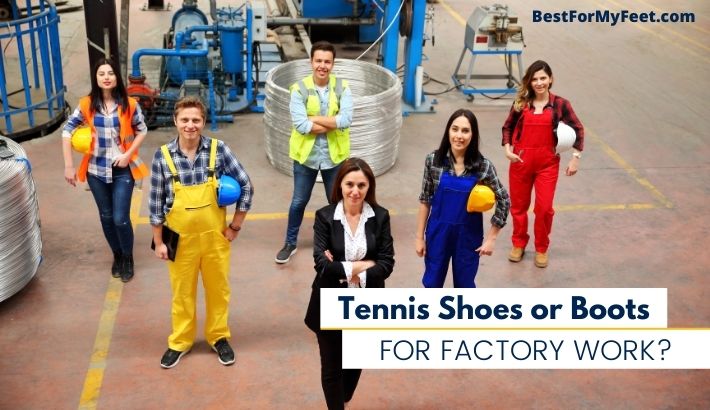Work boots are the golden standard for many jobs out there, but the fact is we’ve all had to go to work for one reason or the other wearing a different type of shoe that seems good enough.

Just the other day, I had to make a quick stop at my friend’s job to hand in some paperwork, so I slipped on a pair of tennis shoes to get there, and to my surprise, I saw other employees wearing tennis shoes too.
The quick answer to the question what is better for factory work, work boots or tennis shoes the answer is work boots. Work boots are better than tennis shoes for factory work.
Yes, work boots could never be as comfy and as lightweight as a pair of tennis shoes…
…but in the long run work boots not only will protect your feet better but sometimes will even help avoid developing foot-related problems such as plantar fasciitis or fallen arches, and many more.
But seeing those tennis shoes had me wondering, how well do work boots and tennis shoes compare to each other? And do they have the same features?
That’s what we’re about to find out, so keep reading to find out the results!
Are tennis shoes good for factory jobs?

According to OSHA, some tennis shoes meet specific work safety requirements depending on what kind of factory you work in.
This all comes down to the fact that tennis shoes are kinda like sneakers, and several sneakers share the same features as work boots. In some cases, retailers mislabel the two by putting them in the wrong categories.
Now, I’m no professional tennis player. But I am a fan of quality footwear and a proud owner of a variety of shoes and boots, including some sweet Nike and Puma tennis shoes.
So naturally, I felt like it was the right time to compare what sets these two types of footwear apart.
Do tennis shoes protect feet like work boots?
Tennis shoes protect the heel and provide good cushioning around the ankles, not to mention a steady grip on muddy surfaces, but tennis shoes are not what you should be looking for if your job is in a hazardous area with lots of sharp and potentially falling objects.
The protection you get in tennis shoes is meant specifically for a tennis court since tennis players need to perform repetitive and aggressive quick movements during a tournament like going side to side, stopping, and turning a lot.
On the other hand, a work boot is an entirely different beast of its own class that brings in every safety feature imaginable for your feet to stay safe in different terrains.
Safety toe caps, shanks, fire resistance, you name it, and you probably won’t find them in even the best pair of tennis shoes since they’re not meant for the same environments.
Are tennis shoes more comfortable to work in than work boots?

A lot of people like tennis shoes for their almost barefoot feel, and even I’ll admit that they’re comfortable for most day-to-day errands and tasks.
The thing is, when it comes to factory jobs where lots of standing and heavy lifting is involved, they’re not fit for the task.
Why?
First off, tennis shoes barely have cushioning, which makes sense when you’re playing tennis and need to be agile during an intense game since their midsoles and overall design is meant to absorb shock from landing on hard surfaces.
In a factory job, your feet will eventually get tired from feeling the hard surface underneath you for long periods, which can impact how you work as a whole and cause fatigue.
Second, tennis shoes have a tighter upper to prevent clay in tennis courts from entering your feet while providing extra stability, but wearing them for too long can cause blisters.
Third, the upper of a tennis shoe is rarely made from rubber or leather. Instead, they’re made from various materials designed to be stiff and breathable, which is a bit problematic for factory jobs.
Allow me to explain.
Tennis shoes are not designed for maximum safety and durability, so even though the materials on the upper can be stiff and heavy, they can absorb liquids, become dirty, and get punctured easily.
On the other hand, work boots almost always stick to good ol’ leather, rubber, or a combination of the two, both of which have been the materials of choice for centuries since they are waterproof, rugged, and can take a beating without losing their durability.
Do work boots or tennis shoes have more features?
When it comes to features that factory workers need, a pair of work boots wins hands down every time.
Work boots cater to the needs of the working man and woman, and just as there are countless types of factory jobs, there’s a work boot for the job.
With work boots, you can expect everything from:
- slip-resistance
- chemical-resistance
- pathogen-resistance
- electrical hazard protection
- steel toe cap, aluminum, or composite toe protection
- shin protection
- fire hazard protection
- metatarsal guards
- electrostatic dissipation
- water resistance
But what about tennis shoes?
If there’s one thing I’ve noticed over the years, it’s that tennis shoes have lots of fancy marketing terms to hype up features, and it’s hard to keep up with them.
Every year, a tennis shoe manufacturer can release several models of the same shoe, with the only real difference being the color or patterns.
To keep it simple, the key features of tennis shoes are:
- Lateral support
- Ankle support
- Heel support
- Shock absorbency
- High-traction outsoles
- Breathable uppers
Are tennis shoes more expensive than work boots?
Many tennis shoes are made by famous brands like Adidas and the like, so it comes as no surprise that tennis shoes are usually more expensive than work boots, and I’m talking in the $300+ range if you happen to prefer major sporting brands.
But as I always say, price isn’t everything.
You can find a lot of great lesser-known yet reputable brands that manufacture tennis shoes for around the $50 mark, all with a great set of features to keep you on your toes if you’re planning on actually playing tennis or maybe walking in them.
Work boots aren’t all that different when it comes to their pricing.
However, fancier work boots can be very expensive, especially if you’re into the more exotic types of leather out there.
At the same time, there are many work boots under the $100 mark that even blend in features and styles you’d only come to expect from a pair of sneakers.
The good news is you can always find out the price of a pair of work boots you’ve got your eyes on right here on my blog by looking at the different work boots round-ups my team and I have created for you.
Who are tennis shoes suited for?
So let’s get back to the most important question.
The short answer is if you have a desk job as a manager and aren’t at risk of chemicals, oil spills, electrocution, or any other type of work hazard, a sturdy pair of tennis shoes will do just fine.
For workers operating machines in a factory, the answer is no 99% of the time since you’re simply putting your feet in danger, which is the last thing you’d want.
Final verdict: work boots or tennis shoes?
We’ve set the facts straight, and it’s pretty clear that work boots are in the lead, especially for factory workers.
So, while a pair of tennis shoes are great for casual events or while sprinting on the tennis court, nothing beats a sturdy and comfortable pair of work boots when you’re on the clock and need to keep your foot in one piece.
Many times the type of footwear you wear at work is determined by the company you’re working for so you should ask them first about what type of footwear you can wear at work.
After wearing safety work boots for over a decade I will always recommend anyone to use safety boots over a pair of tennis shoes, especially in an industrial environment. You’ll thank me later!
Team Members Working On This Page

Victor Adrian – Editor And Webmaster
Construction Professional, driver, crane operator, cleaner, head chef … these are just some of the jobs I did in the past. Working in all these different environments taught me that having good footwear to protect your feet from different dangers at work IS PARAMOUNT for any worker! On this website, I aim to share all my knowledge and personal experience in dealing with different footwear and foot care issues, and hopefully, you can get something out of it. Enjoy!

Jessica Flynn – Writer And Researcher
Love technology, going to the beach, taking care of my body, and writing (amongst other things). You’ll see my face around here a little bit since I’m responsible for part of the research and writing of some of the articles you’re reading on BestForMyFeet.com. I hope you’ll find our content helpful and enjoyable! See you around, thanks for reading!
source https://bestformyfeet.com/work-boots-vs-tennis-shoes-for-factory-work/

No comments:
Post a Comment